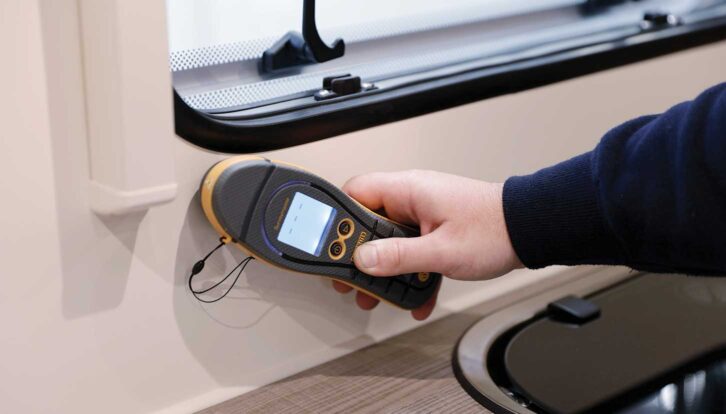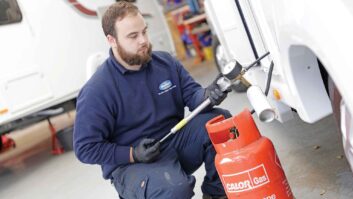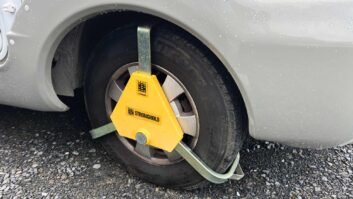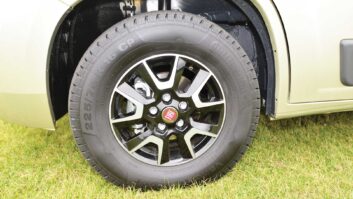So, “why should I bother with a motorhome habitation check?” I am asked this question regularly, and my response is simple. If you need to ask, perhaps you don’t appreciate what tests and checks are carried out in a ‘great’ habitation check. Let me explain why this is a crucial piece of motorhome maintenance.
Ensure your warranty is valid
First, the best motorhome manufacturers require a regular, usually annual, habitation check to honour any warranty applying to your motorhome.
These days, most leisure vehicles come with a three-year habitation area warranty, plus up to 10 years for water ingress, all dependent on timely annual habitation checks. Miss a year and you risk losing the warranty.
Considering a new fridge or a damp repair can cost thousands, investing some £200 for a regular habitation check is a no-brainer.
A moment in time
A specialist engineer performs the habitation check, which usually takes around three to four hours to complete. It is like a motorhome MOT, but should some components fail, you can still use your ‘van under the advice of the failure.
I have heard people say, “I will get one every few years.” That is better than none at all, but is your safety worth risking for three years?

A habitation check is a moment in time when everything is checked and tested. Leaving that moment for three years could mean you are suffering a serious threat to your safety, which could go undetected.
An annual inspection is the accepted frequency for a habitation check, although learning some essential skills to maintain your motorhome is a good idea. However, that’s a different article!
Safety first
“But my motorhome is already 12 years old and out of warranty. What’s the point?” you might ask. Well, it’s all about safety first.
Leisure vehicles usually contain appliances that generate carbon monoxide (CO), often called the silent killer. A habitation check ensures adequate ventilation and checks the appliance flame for a healthy blue colour, which is crucial for safety.
How do you check the flame inside your combi boiler?
That’s where a Kane meter will come in handy. It measures CO levels to ensure safety throughout your motorhome. A Kane meter also removes the vagueness of the blue flame test. After all, my blue could be different from your blue.
Ask your chosen service centre how they will check CO levels in your motorhome, particularly in your Combi boiler, if you have one.
It’s electrifying!
Then there’s the electrical side of things to be considered. The NCC recommends an Electrical Installation Condition Report (EICR) every three years, although some service centres and main dealerships overlook this.
The test, conducted by a competent electrical engineer, assesses the entire electrical installation for safety and inspects both visible and hidden wiring. Electrical cables typically run behind furniture and under floors.
The EICR test checks these cables for integrity and safety. Again, ask your chosen service centre if they offer an EICR test.
Know your enemy
Let’s not forget the enemy of any motorhome: water ingress. Unlike in a house, damp in a ’van doesn’t smell, making it harder to detect.
Signs include surface mould, soft surfaces or water pooling in corners (often caused by the deterioration of external seals, poorly fitted window frames or a crack in a body panel).
Costs to repair damp can escalate quickly.
However, if it has taken hold, an experienced technician can detect such conditions with a damp meter. The meters used in our industry typically cost around £700. The £10 one from your local supermarket doesn’t do the same job or have the same level of accuracy.
Knowing where to look for water ingress and evidence of damp is a paramount skillset here. Specific makes and models are known for leaking and getting damp in certain places, often while still under warranty. Knowing where to look and check for this can take years of experience.
Used vehicle value
Perhaps you are thinking about selling your motorhome. If so, a manufacturer-approved service history, including habitation checks, can significantly boost its value.
Buyers appreciate a vehicle with a documented full-service history. It demonstrates diligence by any previous keeper and is a sign that the vehicle has been cared for throughout its life.

One of the first questions I ask when thinking of selling or buying a motorhome is: “What history has it got, and can you evidence it?”
I am looking for habitation checks carried out by an expert. They might not be a main dealer, but they need to be a reputable engineer. Being told, “We do a damp check with our meter every season,” is not good enough for me.
Final thoughts
Investing in a regular motorhome habitation check is a small price to pay for the safety, compliance and peace of mind it provides.
From ensuring compliance with manufacturer warranty requirements to protecting against CO poisoning, the benefits of a habitation check will far outweigh the costs involved.
So whether your motorhome is brand new or a seasoned traveller, prioritise its wellbeing with a comprehensive habitation check. Your safety and peace of mind are worth it.
You can find out more about me and listen to my podcast at motorhomematt.co.uk
If you’ve enjoyed reading this article, why not get the latest news, reviews and features delivered direct to your door or inbox every month. Take advantage of our brilliant Practical Motorhome magazine SUBSCRIBERS’ OFFER and SIGN UP TO OUR NEWSLETTER for regular weekly updates on all things motorhome related.













